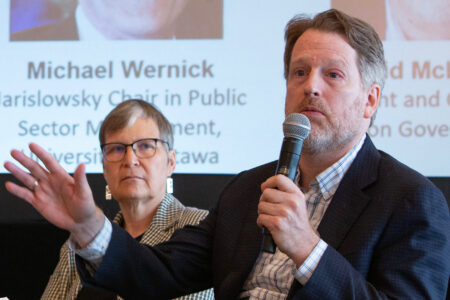
Many people gravitate to political jobs because they love the adrenalin of campaigning and are ideologically committed to building support for their party. Predictably, when an election is called, most political staffers take leave to work on the campaign. However, some remain at their desks in ministers’ offices, including in the Prime Minister’s Office (PMO), in order to support the ministry that continues throughout the writ period.
Ministerial exempt staff, political partisans who are paid by public funds to support ministers with their official duties, play an important role in maintaining the information flow between the department and ministers as well as ongoing dialogue with the public service during the campaign. In essence, they act as democratic insurance so that even during an election period final government decisions and accountability rest with those who earned a democratic mandate in the previous election. Clear public guidelines for conduct during the campaign are essential for ensuring a smooth relationship.
The curtain falls between two worlds
Ministers are usually MPs and need to run for re-election. Yet, during the campaign, ministers continue to be ministers. Government business continues and they retain their legal authority from the Crown. However, it is not business as usual. The caretaker convention dictates that, when Parliament is dissolved and there is no confidence chamber to hold them accountable, ministers will exercise restraint. Through such self-restraint, ministers show respect for the democratic accountability. They also avoid any perception that the governing party is receiving electoral benefit out of its executive privileges.
This convention operates in Canada similarly to other Westminster countries such as the United Kingdom, Australia and New Zealand. Under the convention, routine administration may continue, and ministers must still address urgent and unavoidable matters, such as natural disasters. However, they generally avoid making announcements, commitments or decisions that a new incoming government could not reverse.
The daily rhythm of ministers’ offices changes as soon as the writ drops and the caretaker convention comes into operation. The normally heavy volume of briefing notes from the deputy minister slows considerably. Oral briefings cease. Impromptu face-to-face interactions with departmental officials are less frequent, as the public service turns inward to focus on planning for post-election transition scenarios. It is almost as if a curtain descends to cut off the two worlds.
Nevertheless, since ministers continue to be heads of their departments, they are entitled to be kept apprised of events within their portfolio since they may be asked questions at any time. Further, they may have to respond to urgent matters that cannot wait until after the election. Examples of such circumstances include international crises, ongoing Canadian military engagements, court rulings, domestic emergencies and high-level negotiations such as the culmination of trade agreements. In these situations, ministers must be kept informed, take decisions and give direction. Therefore, they require political staff who can be trusted to exercise sound judgement in deciding what information needs to be conveyed to the minister and when.
Once the minister is engaged, political staff will often convey the minister’s direction and facilitate next steps if needed. This may mean setting up a telephone call with the deputy minister or, depending on the scope of the issue, with other ministers. Political staff can carry out political legwork with other offices to ensure coordination. Sometimes specific documents need to be conveyed to the minister for signature. This is why one member of the minister’s political staff is permitted to accompany the minister while on campaign yet remain as a government employee. This ensures a constant liaison between the department and the minister, who can receive classified information if needed. Just like colleagues remaining in the Ottawa office, this staffer does not take a full-time part in partisan campaign activities, though proximity to the minister is required.
Pivoting to a reactive and defensive approach
In normal times, ministers’ offices devote significant effort to proactively pushing out the government’s strategic messaging. During an election, however, the campaign team assumes almost all responsibility for public messaging. Ministers’ offices, by contrast, adopt an entirely reactive and defensive approach to communication. Their goal is to manage and mitigate risk by identifying potential problems and neutralizing them before they become public controversies. This involves carefully monitoring news stories, including on social media, to identify negative stories that are relevant to the department, gathering background information from the department in order to understand the context, and recommending response lines.
Ministers’ offices maintain media relations capacity so that they may deal directly with journalists and answer questions about departmental business. In order to monitor potential issues across government, the PMO creates an early morning process so that each day political media relations and issues management staffers from across the government can flag emerging issues and recommend responsive messaging. These lines will then be communicated to ministers so that they are prepared for government-related questions as they are campaigning at public events.
In a similar way, work in the Prime Minister’s Office changes when the election is called. Political staffers staying in the PMO no longer work with the PCO on managing the cabinet policy agenda or coordinating long-term strategic communication efforts across government. The Clerk of the Privy Council significantly curtails the volume of daily briefing notes to the prime minister, though this may reflect the prime minister’s desire to focus on the campaign as much as a desire to defend the caretaker convention.
The PMO must always ensure that the prime minister is aware of key developments within government. Of course, this includes information in priority areas such as the economy, national security and international relations. However, details vary from day to day. PMO senior staff may speak with the prime minister when required to answer questions and to pass on information that the prime minister needs to know, either in order to ensure smooth governance or to make sure the PM is briefed about government business that may intrude into the campaign setting.
Finally, while interactions between the PMO and the PCO are reduced during the campaign, there are opportunities for dialogue. PCO staff might wish to discuss “transition to government” questions with PMO. If re-elected, what sort of machinery of government changes might the prime minister consider? Is the PM satisfied with the briefing processes in place or could they be improved? Is the prime minister open to revising the publication providing guidelines on conduct and accountability to ministers? Informal consultations on matters such as these may be helpful, though they would be only one-way conversations. For example, PCO can learn from PMO’s opinion on such matters, but should not offer any advice in return on governing after the election, or on matters of transition.
Overcoming obstacles
Sometimes obstacles emerge in the relationship between ministers and their offices and public servants in the lead up to and during the election campaign. Such obstacles are often rooted in a misunderstanding of the purpose and limits of the caretaker convention.
In 2015, Stephen Harper was the first prime minister to make the caretaker guidelines available publicly. Prime Minister Justin Trudeau did so in 2019. This transparency helps the public understand how government works during an election, and ought to provide more clarity across the entire federal government. In practice, there is still more work to do in understanding when the caretaker period begins, what is meant by caretaker, and where the limits of the convention can be found.
Election campaigns in both 2015 and 2019 occurred in the context of majority governments with a legislated fixed-election date. This meant that everyone knew when the election would likely be held, though not when Parliament would be dissolved. In terms of political activity and public perception, the campaign seemed to extend backwards into the summer. To deal with this, the Trudeau government introduced changes for the pre-writ period to restrict government advertising and limit pre-campaign spending.
These steps, combined with the fact that Parliament was adjourned but not dissolved, could have led public servants in some departments to conclude that ministers were not permitted to operate as usual during the summer. Ministers’ offices had to work to counter this perception by, for example, asserting their entitlement to information and briefings as usual. With the support of PMO and PCO, government operated as normal over the months leading up to the election call. However, additional clarity is needed to ensure that everyone recognizes caretaker restraint only begins with the dissolution of Parliament and not in the period leading up to it.
Who is the caretaker? The answer is consistent with our democratic system of government. While ministers may sometimes choose to delegate more authority to their deputy ministers it is never the officials who act as caretakers or who hold the authority or accountability of ministers. Rather, the government continues to be led by a political cabinet of (usually) democratically elected ministers who, in the absence of an elected House of Commons, act with self-restraint. The ministers are the caretakers.
Ultimately, the caretaker convention is adjudicated politically. When to act—or not to act—according to these criteria is ultimately something that ministers must decide, and they are accountable to Canadians for their decisions.
This article is part of The Insider’s View Behind the Scenes of Election Campaigns special feature.












